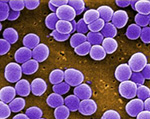7 MRSA Myths
There are several persistent Staph and MRSA myths that create confusion and could prolong your recovery. There are also little-known facts about antibiotics, recurring infections and how contagious these ailments are that even most doctors are unaware of. Below are seven of the most common and important facts and myths to be aware of:
Myth 1 – Antibiotics will stop your infection

Antibiotics may or may not work to stop your infection.
The right antibiotic can often bring quick relief from an infection, but only if you’re lucky enough to get an antibiotic that works. The trouble is, many doctors fail to give their patients the tests needed to identify which antibiotic is best. In fact, most doctors rely on a trial and error process for prescribing antibiotics. For many people, antibiotics fail repeatedly to stop their MRSA.
Even if you do get the right antibiotic, these powerful drugs can have unpleasant and dangerous side effects. Antibiotics also weaken your immune system, increasing your chances of recurring infections later. So even if these drugs do stop your current outbreak, there’s a good chance the condition will come back again in days, weeks, or even months.
Antibiotics are a valid treatment option, but they may not be enough to stop the infection. Some remedies and therapies can help antibiotics to work better and improve their side effects. Depending on the severity of infection, using antibiotics as a last resort is another valid option. Given their pros and cons, it’s best to decide for yourself whether or not to take these drugs after considering all your options with your doctor’s help.
Myth 2 – There must be a cure
There certainly are some powerful complementary remedies and potent drugs for support with infections. But no single remedy by itself, no matter how effective, can end every infection overnight and forever. Here’s why:
- Skin, nose and internal infections all require a different approach for the best results.
- Children, infants and pregnant women often require different treatments for safety reasons.
- Many remedies that are helpful for mild infections are not strong enough for severe MRSA and Staph.
- At best, treatments and remedies are only a short-term solution. Because Staph and MRSA very often recur, other measures are needed for best long-term results.
Some websites tout how a single herb, essential oil or pH product can stop an infection by itself. But every infection is different, so cookie cutter approaches often don’t work, especially in the long run. For stubborn infections, you want a treatment approach you can easily customize to your unique needs and use along with your doctor’s treatments.
Myth 3 – MRSA is only a risk in hospitals

MRSA has moved out of hospitals and is now in our communities.
The majority of these infections are still picked up in hospitals. However, the fastest growing breeding ground for this disease is now in the community.
This so-called Community-Associated MRSA (CA-MRSA) often infects young, strong and otherwise healthy people. According to the Journal of the American Medical Association, CA-MRSA has become the most frequent cause of skin and soft tissue infections presented to emergency rooms in the U.S.
Common places to find these superbug bacteria are gyms, schools, offices, sports teams, long-term care facilities and in any crowded or unsanitary environment. Community MRSA is often more virulent, invasive and serious than Healthcare-Associated MRSA (HA-MRSA) and it can worsen quickly.
There are simple steps you can take to protect yourself. Consistent hand washing and good hygiene are a must. Using remedies that block bacteria and support your natural defenses while visiting crowded public places is a big help. Keeping your immune system in working order is crucial and often overlooked.
Myth 4 – Your doctor has experience dealing with MRSA

Not all doctors are familiar with Staph or MRSA.
While some doctors have experience treating MRSA and Staph, many others still have little or no experience with these infections. Even fewer doctors have any training in complementary medicine. So even if your healthcare provider does have experience with superbugs, antibiotic drugs are likely the only treatment option they have to give you.
Even specialists, such as Infectious Disease (ID) doctors, can be inexperienced in all the available treatment options. Amazingly, some people’s doctors actually ask THEM what ailment they think they have!
Your doctor is a knowledgeable and valuable resource, but doctors are not perfect or all-knowing. And they should not be considered the unquestionable authority on your health.
You know yourself better than anybody else does. If you want good health care, you need to understand what your options are and be your own health advocate. That means finding a better doctor if yours is not the right one, or getting a second opinion. It also means being proactive, standing up for your health and knowing how to work as a partner with healthcare professionals.
Myth 5 – MRSA is not a big deal
Unfortunately, many doctors downplay Staph and MRSA to their infected patients. Below are a few common “words of wisdom” people have heard from their doctors:
“MRSA is everywhere now… it’s not a big deal”
“There’s not much you can do about MRSA”
“If you get infected, antibiotics will make it go away”
While many people experience mild symptoms that are relatively easy to treat, others suffer from severe, long-lasting challenges that don’t respond to standard treatments. Below are facts about MRSA and Staph that underscore the seriousness of these infections:
- Staph and especially MRSA can worsen and spread quickly.
- MRSA can be very hard to get rid of using mainstream treatments alone.
- Newer strains of these bacteria now found in the community are striking generally healthy people.
- MRSA and Staph can be quite contagious because the bacteria spread on people and contaminated surfaces.
- MRSA can spread through the air. Studies show that MRSA bacteria can circulate in the air between hospital patients and from objects and surfaces.
This information is not here to scare you. But it’s important to know the potential risks so you can minimize them. Staph and MRSA can become serious and even life threatening and they should not be taken lightly. On the other hand, you have many powerful treatment and prevention options, many of which are very effective and easy to use, yet seldom heard of.
Myth 6 – Testing is unnecessary

Only a test can determine if you are infected.
If you think you have Staph or MRSA, then testing is quite important, especially if you plan to take antibiotics. Doctors can perform a simple test to see what is causing your condition. This test will help you get the right prescription, helping you avoid costly and often dangerous drugs that don’t work.
Most doctors will prescribe a general broad spectrum antibiotic for anything that looks like a bacterial infection. The problem is, general antibiotics often have no effect on MRSA and can actually make your condition worse. And taking antibiotics that don’t work wastes your time and money, delays your proper treatment, exposes you to nasty side effects and weakens your immune system, all for no reason.
Getting tested is the only way to determine which antibiotic will work against your infection. It’s also the best first step you can take if you plan to take antibiotics.
Myth 7 – If you get MRSA, you’ll always have it
Some people with recurring infections are told by their doctors they will always have it. They are told there’s nothing more that can be done. When it comes back again, the only option given is more antibiotics and hoping for the best.
Is this really true? If relying solely on mainstream medicine, then yes, the only option would be more antibiotics that may or may not work.
Fortunately, you can make your mainstream treatments work better and take added steps to keep MRSA away for good. There are dozens of effective options that fall outside the “standard protocol” treatments most people get. These enhancing treatment options are already used by a growing number of medical and naturopathic doctors in the U.S. and around the world. And unlike antibiotics alone, these improved options actually support the body and help keep the infection from coming back again.
Michelle has heard from people who have successfully “de-colonized” from MRSA using antibiotics and synergistic treatment methods. She has also seen how supporting the immune system and targeting biofilms and L-form bacteria can help. So there is evidence that you can de-colonize successfully. The key is to know all of your options, work with the right doctors, and tailor a treatment program that best suits your particular needs.
There is hope
Your body is a self-healing mechanism. With a little assistance, your body can perform miracles by the minute to overcome disease. If there was a magical miracle cure for MRSA and Staph, it would be your very own immune system.
Michelle wrote the program MRSA Secrets Revealed to cover all the bases to get rid of Staph and MRSA for good. It will answer all your questions about how to get rid of these infections and give you the tools you need to get better quickly and permanently. Her program includes details about using antibiotics, testing, working with your doctor, powerful complementary remedies and how to protect yourself better.
If you want help putting all the pieces of the treatment puzzle together, plus ongoing support along the way, then take a look at this program today.

- Find out more about the 3 steps to stop Staph and MRSA infections.
- Find out more about What doctors won’t tell you about MRSA and Staph.
- Learn more about my MRSA Secrets Revealed program for overcoming these infections.






